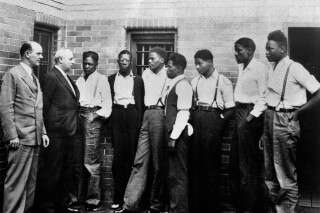Today in History: March 25, ‘Scottsboro Boys’ are taken off train and wrongly accused

In this May 1, 1935 file photo, attorney Samuel Leibowitz from New York, second left, meets with seven of the Scottsboro defendants at the jail in Scottsboro, Ala. just after he asked the governor to pardon the nine youths held in the case. From left are Deputy Sheriff Charles McComb, Leibowitz, and defendants, Roy Wright, Olen Montgomery, Ozie Powell, Willie Robertson, Eugene Williams, Charlie Weems, and Andy Wright. The black youths were charged with an attack on two white women on March 25, 1931. (AP Photo)
Today in History:
On March 25, 1931, in the so-called “Scottsboro Boys” case, nine young Black men were taken off a train in Alabama, accused of raping two white women; after years of convictions, death sentences and imprisonment, the nine were eventually vindicated.
On this date:
In 1634, English colonists sent by Lord Baltimore arrived in present-day Maryland.
In 1894, Jacob S. Coxey began leading an “army” of unemployed from Massillon (MA’-sih-luhn), Ohio, to Washington D.C., to demand help from the federal government.
In 1911, 146 people, mostly young female immigrants, were killed when fire broke out at the Triangle Shirtwaist Co. in New York.
In 1915, the U.S. Navy lost its first commissioned submarine as the USS F-4 sank off Hawaii, claiming the lives of all 21 crew members.
In 1947, a coal-dust explosion inside the Centralia Coal Co. Mine No. 5 in Washington County, Illinois, claimed 111 lives; 31 men survived.
In 1954, RCA announced it had begun producing color television sets at its plant in Bloomington, Indiana.
In 1960, Ray Charles recorded “Georgia on My Mind” as part of his “The Genius Hits the Road” album in New York.
In 1965, the Rev. Martin Luther King Jr. led 25,000 people to the Alabama state capitol in Montgomery after a five-day march from Selma to protest the denial of voting rights to Blacks. Later that day, civil rights activist Viola Liuzzo, a white Detroit homemaker, was shot and killed by Ku Klux Klansmen.
In 1987, the Supreme Court, in Johnson v. Transportation Agency, ruled 6-3 that an employer could promote a woman over an arguably more-qualified man to help get women into higher-ranking jobs.
In 1990, 87 people, most of them Honduran and Dominican immigrants, were killed when fire raced through an illegal social club in New York City. (An arsonist set the fire after being thrown out of the club following an argument with his girlfriend; Julio Gonzalez died in prison in 2016.)
In 1996, an 81-day standoff by the anti-government Freemen began at a ranch near Jordan, Montana.
In 2017, stars and fans gathered for a public memorial to honor the late mother-daughter film stars Debbie Reynolds and Carrie Fisher.
In 2018, Linda Brown, who as a young girl in Kansas became embroiled in a landmark 1954 Supreme Court case that challenged segregation in public schools, died at the age of 75.
In 2022, Taylor Hawkins, drummer for the Foo Fighters, died at age 50 in a hotel in Bogotá, Colombia during the band’s South American tour.
In 2023, powerful tornadoes tore through parts of the Deep South, killing 26 people in Mississippi and obliterating dozens of buildings.
